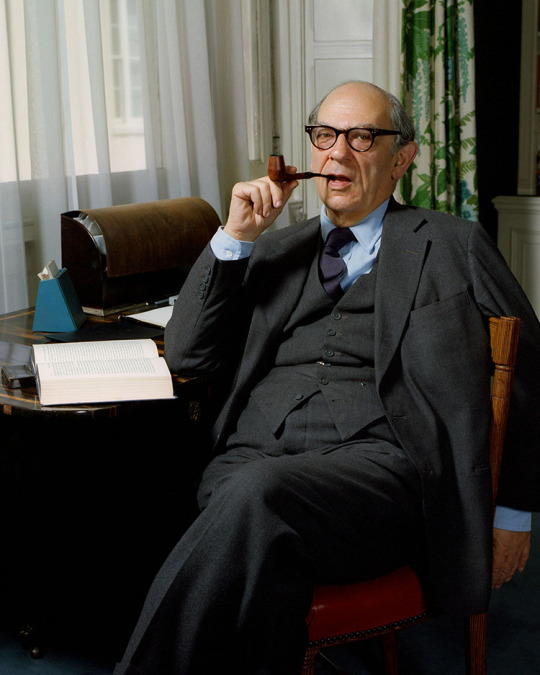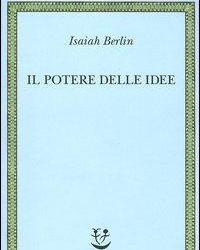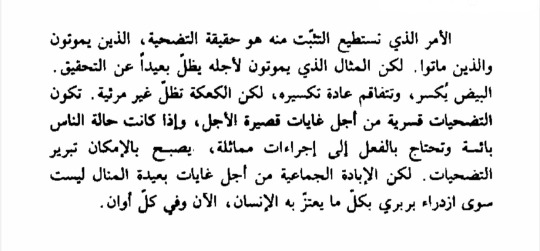#isaiah berlin
Text

Only the barbarians are not curious to know where they come from, how they got to where they are now, where they seem to go, if they want to go, and if so, why, and if not, why not.
Isaiah Berlin
#berlin#isaiah berlin#quote#politics#philosophy#society#culture#civilisation#western society#barbarians#heritage#custom#tradition
56 notes
·
View notes
Text
"...the harsh, materialistic and 'nihilistic' criticism of the 1860s and 1870s is due not merely to the change in economic and social conditions ... but in at least equal measure to the prison walls within which Nicholas I had enclosed the lives of his thinking subjects. This led to a sharp break with the polite civilisation and the non-political interests of the past, to a general toughening of fibre and exacerbation of political and social differences. ... In due course there emerged a vast and growing army of practical revolutionaries, conscious - all too conscious - of the specifically Russian character of their problems, seeking specifically Russian solutions. ... Henceforth the Russian radicals accepted the view that ideas and agitation wholly unsupported by material force were necessarily doomed to impotence ... The experience obtained by both sides in the struggle during these dark years was a decisive factor in shaping the uncompromising character of the later revolutionary movement in Russia."
'Russia and 1848', in Russian Thinkers, by Isaiah Berlin
#russian socialism#1848#radicalism#revolutionary movement#violent revolution#revolutionary violence#all or nothing#nihilism#repression#isaiah berlin
2 notes
·
View notes
Text
youtube
Political Judgement (Isaiah Berlin 1957)
2 notes
·
View notes
Text
The more we know about the past, the more we know what is not true about the present.
Isaiah Berlin
32 notes
·
View notes
Text

«Para Constant, Mill, Tocqueville y la tradición liberal a la que ellos pertenecen, una sociedad no es libre a no ser que esté gobernada por dos principios que guardan relación entre sí: primero, que solamente los derechos, y no el poder, pueden ser considerados como absolutos, de manera que todos los hombres, cualquiera que sea el poder que les gobierne, tienen el derecho absoluto de negarse a comportarse de una manera que no es humana, y segundo, que hay fronteras, trazadas no artificialmente, dentro de las cuales los hombres deben ser inviolables, siendo definidas estas fronteras en función de normas aceptadas por tantos hombres y por tanto tiempo que su observancia ha entrado a formar parte de la concepción misma de lo que es un ser humano normal y, por tanto, de lo que es obrar de manera inhumana o insensata; normas de las que sería absurdo decir, por ejemplo, que podrían ser derogadas por algún procedimiento formal por parte de algún tribunal o de alguna entidad soberana.»
Isaiah Berlin: Cuatro ensayos sobre la libertad. Alianza Editorial, pág. 236-237. Madrid, 1998.
TGO
@bocadosdefilosofia
@dies-irae-1
#isaiah berlin#constant#mill#tocqueville#libertad#libertad negativa#derechos#libertades#soberanía#libertad positiva#tradición liberal#imposición#voluntad#ser humano#ser humano normal#leyes#coacción#ausencia de coacción#poder#gobierno#inviolabilidad#tribunal#entidad soberana#teo gómez otero
6 notes
·
View notes
Text
«Entre los fragmentos del poeta griego Arquíloco, hay un verso que reza: «Muchas cosas sabe la zorra, pero el erizo sabe una sola y grande». Los estudiosos han discrepado acerca de la correcta interpretación de estas oscuras palabras, que quizás sólo quieran decir que la zorra, pese a toda su astucia, se da por vencida ante la única defensa del erizo. Figuradamente, sin embargo, es posible extraer de ellas un significado que señala una de las diferencias más hondas entre escritores y pensadores y, quizás, entre los seres humanos en general. Porque media un gran abismo entre quienes, por un lado, relacionan todo con una única visión central, un sistema más o menos congruente o consistente, en función del cual comprenden, piensan y sienten —un único principio universal, organizador, que por sí solo da significado a todo lo que son y dicen—, y por otro, quienes persiguen muchos fines, a menudo inconexos y hasta contradictorios, ligados, si lo están, por alguna razón de facto, alguna causa psicológica o fisiológica, sin que intervenga ningún principio moral o estético; estos últimos viven vidas, realizan acciones y sostienen ideas centrífugas antes que centrípetas, su pensamiento es desparramado o difuso, ocupa muchos planos a la vez, aprehende la esencia misma de una vasta variedad de experiencias y objetos por lo que estos tienen de propio, sin pretender, consciente ni inconscientemente, integrarlos —o no integrarlos— en una única visión interna, inmutable, globalizadora, a veces contradictoria, incompleta y hasta fanática. El primer tipo de personalidad intelectual y artística es el de los erizos; el segundo, el de las zorras; y podemos decir, evitando una clasificación excesivamente rígida pero sin temor a contradecirnos, que, vistos así, Dante pertenece a la primera categoría, Shakespeare a la segunda; Platón, Lucrecio, Pascal, Hegel, Dostoievski, Nietzsche, Ibsen y Proust son, en distinta medida, erizos; Herodoto, Aristóteles, Montaigne, Erasmo, Molière, Goethe, Pushkin, Balzac y Joyce son zorras».
- Isaiah Berlin
#isaiah berlin#fox#porcupine#shakespeare#plato#lucretius#pascal#hegel#dostoyevski#nietzsche ağladığında#ibsen#proust#moliere#goethe#pushkin#balzac#james joyce#zorra#erizo#counterculture
5 notes
·
View notes
Quote
Few things have done more harm than the belief on the part of individuals or groups...that he or she or they are in sole possession of the truth, especially about how to live, what to be and do -- that those who differ from them are not merely mistaken, but wicked or mad: and need restraining or suppressing. It is terrible and dangerous arrogance to believe that you alone are right, have a magical eye which sees the truth, and that others cannot be right if they disagree.
Isaiah Berlin
3 notes
·
View notes
Link
3 notes
·
View notes
Text
Isaiah Berlin (Il potere delle idee)

Se si obietta che tutto questo appare molto astratto e remoto dall'esperienza quotidiana, qualcosa che si preoccupa troppo poco degli interessi essenziali - la felicità e l'infelicità e il destino ultimo degli uomini comuni - la risposta è che si tratta di un'accusa infondata. Gli uomini non possono vivere senza descrivere e spiegare a se stessi l'universo. E i modelli che impiegano nel farlo non possono non influenzare profondamente le loro vite, anche e anzi specialmente quando ne sono inconsapevoli: buona parte dell'infelicità e della frustrazione degli uomini è dovuta all'applicazione meccanica e inconsapevole (oltre che deliberata) di modelli là dove non funzionano. Chi può dire quanta sofferenza sia stata causata dall'esuberante utilizzazione del modello organico in politica, o dalla concezione dello Stato come opera d'arte, o dalla rappresentazione, da parte dei teorici totalitari della nostra epoca, del dittatore come l'ispirato forgiatore della vita degli uomini? Chi dirà quanto male e quanto bene siano venuti, in epoche precedenti, dall'esagerata applicazione ai rapporti sociali di metafore e modelli costruiti ricalcando i paradigmi dell'autorità paterna (soprattutto nella sfera dei rapporti tra i reggitori dello Stato e i governati, o tra i preti e il laicato)?
Se c'è una speranza di realizzare un ordine razionale sulla terra, o di arrivare a un giusto apprezzamento dei numerosi e svariati interessi che dividono i diversi gruppi di esseri umani - una conoscenza indispensabile a qualunque tentativo di valutare i loro effetti, e i modelli della loro interazione e delle sue conseguenze, mirando a trovare compromessi praticabili attraverso i quali gli uomini possano continuare a vivere e a soddisfare i loro desideri senza schiacciare ciò facendo gli altrettanto essenziali desideri e bisogni degli altri essa sta nel portare alla luce questi modelli sociali, morali e politici, e soprattutto i sottostanti paradigmi metafisici in cui sono radicati, mirando a esaminare se siano oppure no adeguati al loro compito.
Il compito perenne dei filosofi è di esaminare qualunque cosa appaia refrattaria ai metodi delle scienze o dell'osservazione quotidiana: per esempio le categorie, i concetti, i modelli, i modi di pensare o di agire, e in particolare le maniere in cui si scontrano, puntando a costruire altre metafore, immagini, simboli e sistemi di categorie che siano meno internamente.
Prima uscita: 19 novembre 2023
Traduttore: G.Ferrara degli Uberti
Editore: Adelphy
Pagine: 352
0 notes
Text
"The Hedgehog and the Fox: An Essay on Tolstoy's View of History - Second Edition" by Isaiah Berlin, Henry Hardy, Michael Ignatieff -
Translation: Explain why the most honorable thing in the world, in the judgment of all mankind without exception, is the right to innocently shed innocent blood.
"Maistre’s ‘Expliquez pourquoi ce qu’il y a de plus honorable dans le monde, au jugement de tout le genre humain sans exception, est le droit de verser innocemment le sang innocent?’,"
Start reading this book for free: https://a.co/dKcdhDw
0 notes
Text
"The liberals of the 1840s may have been stirred to genuine compassion or indignation by the plight of the peasantry: the institution of serfdom had long been an acute public problem and indeed a great and recognised evil. Yet, excited as they were by the latest social and philosophical ideas which reached them from the West, they felt no inclination to spend their time upon detailed and tedious researches into the actual condition of the peasantry [...] During the period of enforced insulation after 1849, with Europe in the arms of reaction, and only Herzen's plaintive voice faintly audible from afar, those socially conscious Russian intellectuals who had survived the turmoil directed their sharp and fearless analytical apparatus upon the actual conditions in which the vast majority of their countrymen were living. Russia, which a decade or two earlier was in considerable danger of becoming a permanent intellectual dependency of Berlin or of Paris, was forced by this insulation to develop a native social and political outlook of her own."
'Russia and 1848', in Russian Thinkers, by Isaiah Berlin
1 note
·
View note
Video
youtube
The Impact of Marx on the 19th Century (Isaiah Berlin 1964)
9 notes
·
View notes
Text
"The Hedgehog and the Fox: An Essay on Tolstoy's View of History - Second Edition" by Isaiah Berlin, Henry Hardy, Michael Ignatieff -
"THERE IS A LINE among the fragments of the Greek poet Archilochus which says: ‘The fox knows many things, but the hedgehog knows one big thing.’"
Start reading this book: https://a.co/eeC332c
0 notes
Text
But to manipulate men, to propel them toward goals which you—the social reformers—see, but they may not, is to deny their human essence, to treat them as objects without wills of their own, and therefore to degrade them.
Isaiah Berlin
37 notes
·
View notes
Text
Die Zeit ist reif und Herdegen kommt bald mit Staatsraison und objektive Werteordnung um die Ecke. In dem Lüth-Konzept einer objektiven Ordnung, die auf „positive“ Freiheit abzielt, also einer solchen, die Menschen in die Richtung eines bestimmten Ziels zur Verwirklichung ihrer Anlagen oder Projekte lenkt, liegt eine Tendenz nach totalitärer Konsequenz. Wo unsere Bestrebungen auf das Gleis eines Gemeinschaftsunterfangens umgeleitet werden, taucht die deutsche Freiheitssackgasse auf.
0 notes
